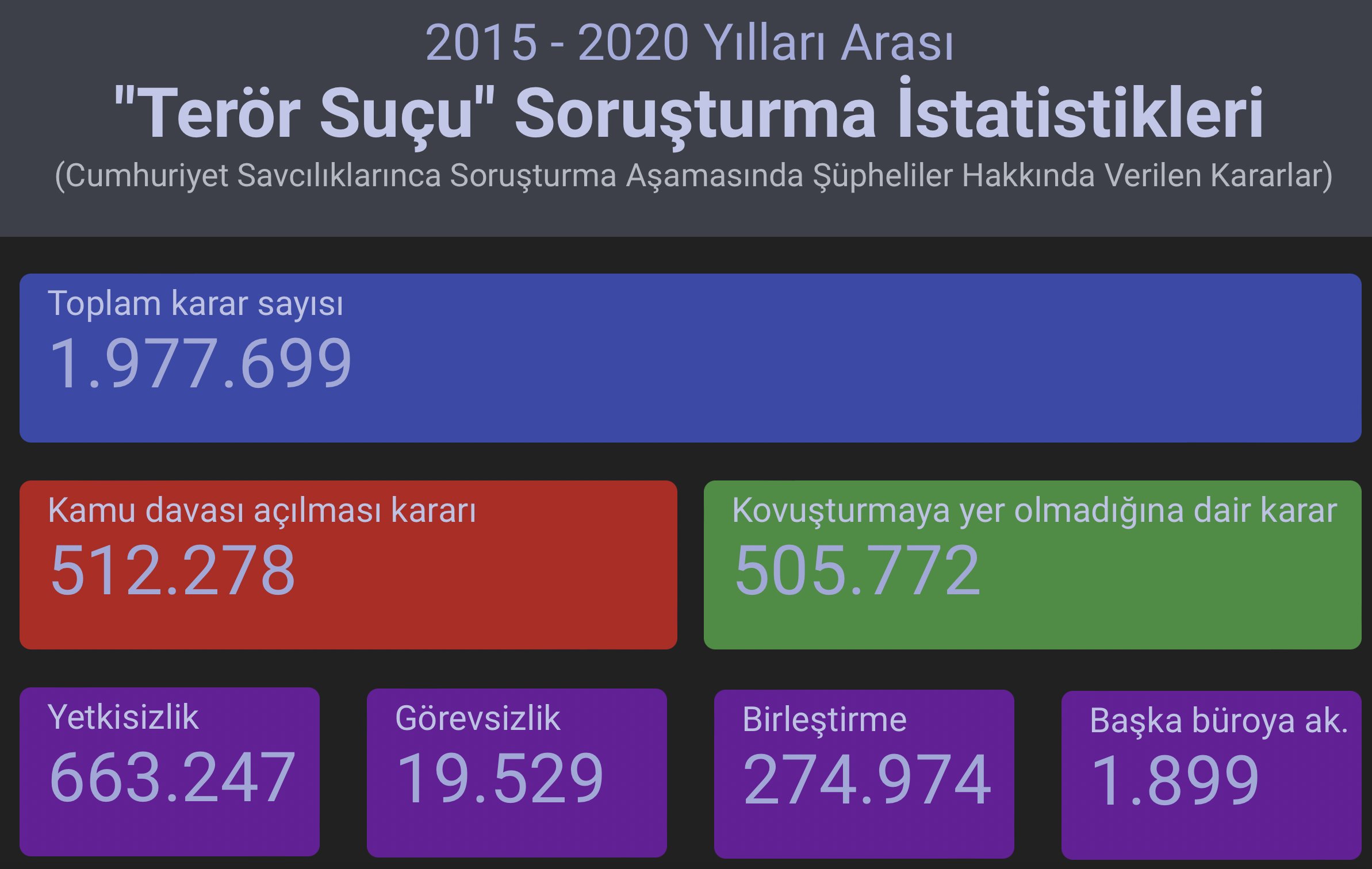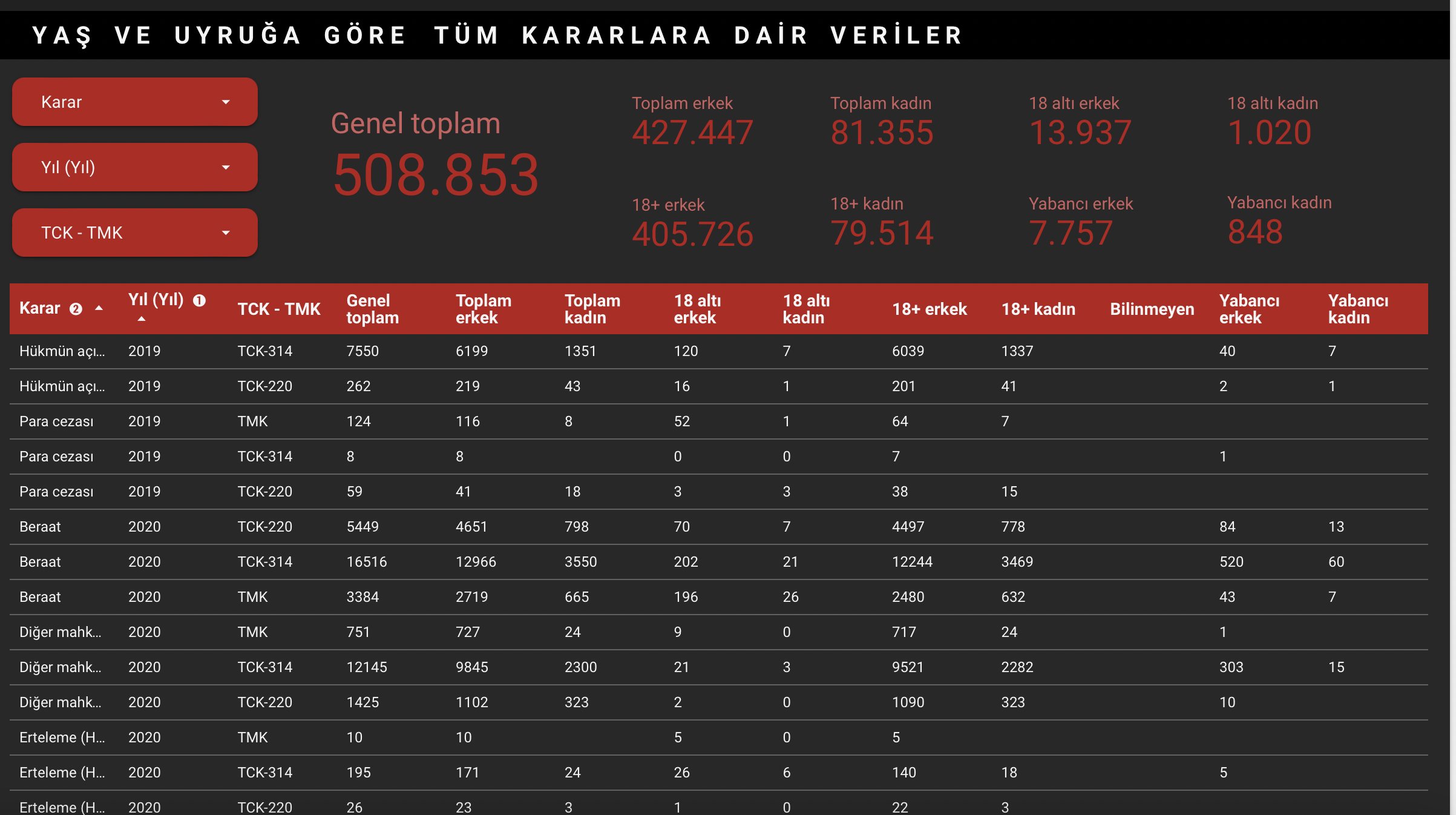Levent Kenez/Stockholm
Following a controversial coup attempt on July 15, 2016, a witch-hunt launched by the government of Turkish President Recep Tayyip Erdoğan, which declared opponents as terrorists, has yielded the result that a record number of Turkish citizens were investigated and convicted of terrorism.
According to official statistics, terrorism investigations were launched into 2 million people between 2015 and 2020. Given the fact that the Turkish population over the age of 18 is 59 million, one in every 30 people in Turkey faced trumped-up terrorism charges.
Members of the Gülen movement, a group that is critical of the government, constitute the overwhelming majority of those who are prosecuted and convicted.
According to data compiled from official statistics on terrorism convictions between 2015 and 2020 by Solidarity with OTHERS, a nongovernmental human rights organization based in Brussels, terrorism investigations were launched into 1,977,699 people by prosecutor’s offices all over Turkey.
Criminal cases were filed against 512,278 people, while prosecutors decided not to pursue charges against 505,772. These figures will definitely increase when it is clear what action will be taken against those who are still under investigation. Courts dismissed the cases against 663,247 people due to a decision of rejection of venue, meaning the cases fall within the jurisdiction or responsibility of other courts.

As a result of the cases filed between 2015 and 2020, the courts handed down rulings for 508,853 people — 427,447 men and 81,455 women. A total of 14,957 of those against whom terrorism charges have been filed are under the age of 18, and 1,020 of them are women.
A total of 320,063 people were sentenced to various lengths of imprisonment on terrorism charges between 2015 and 2020. Some 30,000 people are estimated to be behind bars in Turkey at the moment. The other 290,000 were released because their time in prison corresponded to the sentences they received, because they had completed their sentences or because they are free on appeal, waiting for the court to either uphold or reverse their convictions.
According to statistics released by the Council of Europe (CoE), as of January 2020 out of 30,524 prisoners convicted on terrorism charges in the 47 CoE member states, 29,827 were in Turkey. In other words, 98 percent of all inmates convicted of terrorism in all of Europe are residents of Turkey, demonstrating how the government abuses its counterterrorism laws to punish critics, opponents and dissidents in this country of 84 million that is suffering under the iron grip of President Erdoğan.

The Ministry of Justice and the Turkish Statistical Institute have not disclosed how many people have been imprisoned on terrorism charges since 2020. The reason for this, experts say, is that Turkey does not want the much-criticized anti-terror law and the unknown number of Islamic State in Iraq and Syria (ISIS) prisoners to be discussed.
Nordic Monitor previously published a secret intelligence note dispatched by the Security General Directorate (Emniyet) stating that ISIS militants had been released in stages from prisons. “Individuals who were caught trying to enter our country illegally while operating in areas controlled by the ISIS terrorist group in Syria and arrested on charges of ‘membership in an armed terrorist organization’ have gradually been released from prison,” the intelligence note filed on May 8, 2016, stated.
It is worth noting that the Interior Ministry, which in 2018 had published on a monthly basis the number of persons detained in counterterrorism operations on its website, stopped sharing that information as of January 1, 2019, for unknown reasons.
Turkey’s anti-terrorism legislation has been criticized by the European Union, the Council of Europe, the United Nation’s human rights bodies and international human rights organizations for years. Nordic Monitor previously reported that a joint UN letter underlined that Turkey’s anti-terror law (No. 3713) does not comply with its international law obligations and that the country’s anti-terror legal framework should be urgently revised.
Fionnuala Ní Aoláin, special rapporteur on the promotion and protection of human rights and fundamental freedoms while countering terrorism; Elina Steinerte, vice chair of the working group on arbitrary detention; Irene Khan, special rapporteur on the promotion and protection of the right to freedom of opinion and expression; Clement Nyaletsossi Voule, special rapporteur on the rights to freedom of peaceful assembly and of association; Mary Lawlor, special rapporteur on the situation of human rights defenders; and Diego García-Sayán, special rapporteur on the independence of judges and lawyers, sent a joint letter, dated August 26, 2020 to the Turkish government to express serious concern with the framework of the anti-terrorism law implemented by the Turkish government and its compatibility with Turkey’s international and human rights law obligations.
In the letter, they recommended a review and reconsideration of the anti-terror framework. “We express concern that Turkey’s anti-terror legal framework in its current form does not conform to international counter-terrorism nor human rights standards … [and that it] be reviewed in order to ensure … compatibility with Turkey’s international legal obligations,” the UN letter stated. According to the letter, the anti-terror law limits the exercise of freedoms of opinion, expression and association and impacts the right to a fair trial and the prohibition of arbitrary detention.
Meanwhile, the situation of elderly convicts and their inability to access health care is frequently discussed on social media. Human rights observers also claim that women who have to take their children with them to prison have difficulty obtaining basic necessities for their children. For instance, the amount of food to be served is calculated according to the number of prisoners in a ward, and since children are not considered prisoners, no food is provided for them.












